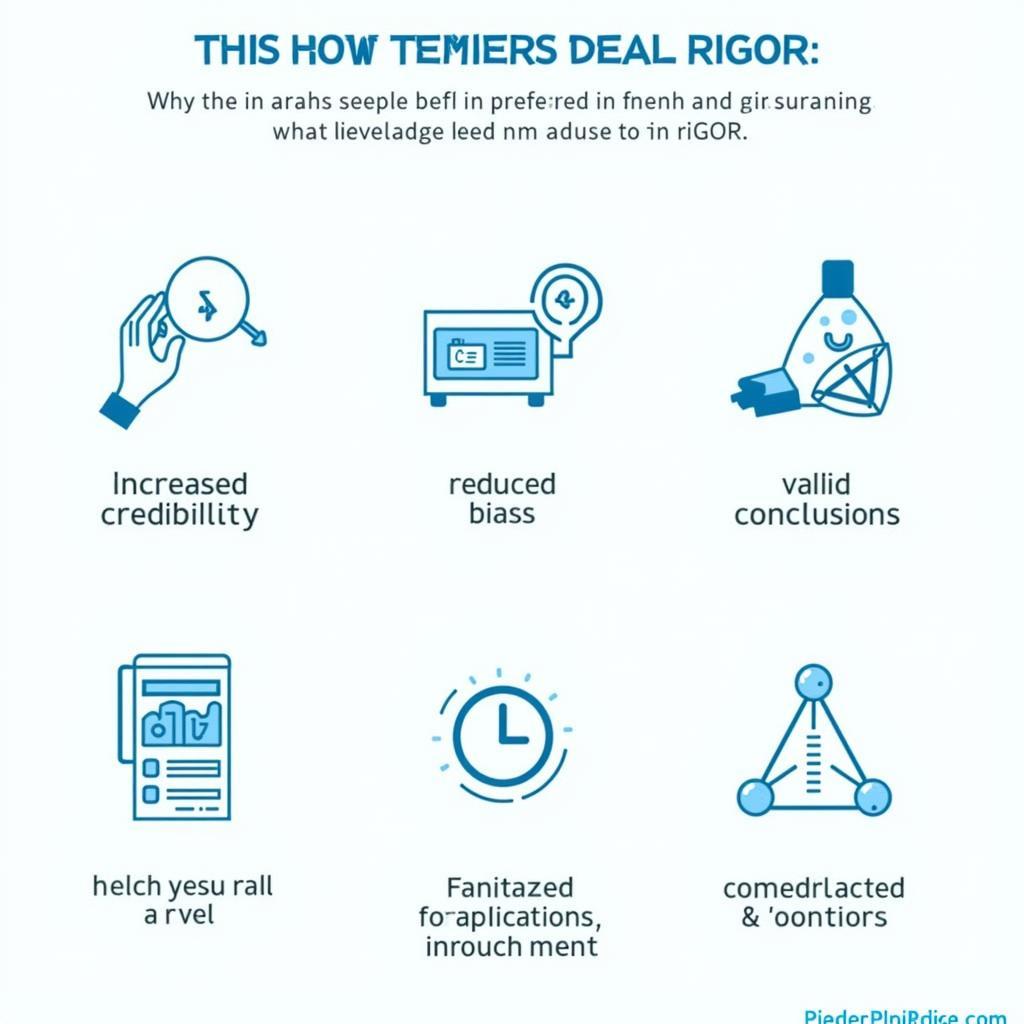Rigor in research is the bedrock of credible and reliable findings, particularly vital in fields like paranormal investigation where skepticism abounds. It signifies a commitment to meticulous methodology, thorough analysis, and a relentless pursuit of objective truth. This article delves into the Meaning Of Rigor In Research, exploring its key components and emphasizing its importance across various disciplines, including the enigmatic realm of paranormal studies.
What Does Rigor in Research Really Mean?
Rigor isn’t about making research more complex; it’s about enhancing its trustworthiness. It ensures that the research process is systematic, transparent, and minimizes bias. Think of it as the backbone of any investigation, providing the structure and support needed to reach valid conclusions. This involves carefully considering the research question, selecting appropriate methods, gathering and analyzing data meticulously, and interpreting findings objectively. Without rigor, research results become questionable, open to interpretation, and ultimately, unreliable.
Key Components of Rigor
Several key components contribute to rigor in any research endeavor:
- Clearly Defined Objectives: A well-defined research question provides direction and focus, guiding the entire research process.
- Appropriate Methodology: The chosen methods must align with the research objectives and be capable of answering the research question effectively. In paranormal research, this might involve employing various investigative techniques like EVP analysis or thermal imaging.
- Robust Data Collection: Data collection must be systematic and comprehensive, minimizing the risk of bias or errors. This includes documenting every step, ensuring the integrity of the evidence, and maintaining chain of custody.
- Thorough Analysis: Rigorous analysis involves applying appropriate statistical or qualitative techniques to interpret the collected data objectively. It also includes acknowledging limitations and uncertainties in the findings.
- Transparency and Reproducibility: The entire research process should be documented transparently, allowing others to scrutinize the methods and replicate the study, further validating the findings. This is especially crucial in paranormal research, allowing for peer review and independent verification.
Rigor in Paranormal Research: A Special Case?
The study of paranormal phenomena presents unique challenges to maintaining rigor. The subjective nature of many experiences, the lack of readily measurable data, and the prevalence of anecdotal evidence can make applying traditional research methods difficult. However, this doesn’t negate the need for rigor; it rather necessitates adapting the principles to fit the unique context.
For instance, rigorous paranormal research might involve:
- Establishing clear protocols for data collection, including standardized methods for documenting evidence.
- Utilizing multiple investigative techniques to corroborate findings.
- Employing blind or double-blind procedures to minimize observer bias.
- Seeking expert analysis from various fields, such as psychology, physics, and engineering.
- Acknowledging and addressing potential alternative explanations for observed phenomena.
Dr. Evelyn Reed, a prominent researcher in anomalous psychology, emphasizes, “Rigor in paranormal research is not about proving the existence of ghosts, but about applying scientific principles to explore unexplained phenomena. It’s about asking critical questions, examining the evidence objectively, and remaining open to all possibilities.”
Why is Rigor Important?
Rigor is essential for several reasons:
-
Enhances Credibility: Rigorous research builds trust in the findings, increasing their acceptance within the scientific community and the public. This is particularly important in a field like paranormal research, where skepticism is often high. You can find more about research credibility in our article on the purpose of research paper.
-
Minimizes Bias: Rigorous methodology helps to reduce bias, ensuring that the research results are a reflection of reality rather than the researcher’s preconceived notions.
-
Supports Valid Conclusions: Rigor ensures that the findings are supported by the evidence and that the conclusions drawn are justified.
-
Facilitates Replication: Transparent and well-documented research allows others to replicate the study, which strengthens the validity of the findings and contributes to the accumulation of knowledge. Check out our resources on the research lifecycle to understand how replication fits into the bigger picture.
 Importance of Rigor in Research
Importance of Rigor in Research
Conclusion
Rigor in research is not merely a set of rules, but a mindset. It’s a commitment to pursuing truth through meticulous methodology, objective analysis, and transparent reporting. While applying rigor to paranormal research presents unique challenges, it’s precisely this rigor that can elevate the field and pave the way for a deeper understanding of the unexplained. Applying rigor can also be useful for other types of research like those found in our article bureau of education research. By embracing rigorous methods, Paranormal Researchers can contribute to a more nuanced and evidence-based exploration of the mysteries that lie beyond the veil of conventional science. Further information about different research types can be found in our article about basic applied and translational research. For practical applications of research, explore our resource on research badding assinment pubmed assignment.
FAQ
- What is the difference between rigor and validity in research?
- How can I ensure rigor in my own paranormal investigations?
- What are some common pitfalls to avoid when striving for rigor in research?
- Are there specific software or tools that can help with maintaining rigor in data analysis?
- How can I evaluate the rigor of a research study I’m reading?
- Can qualitative research be rigorous?
- What role does peer review play in ensuring rigor?
For assistance, contact us at Phone: 0904826292, Email: research@gmail.com or visit us at No. 31, Alley 142/7, P. Phú Viên, Bồ Đề, Long Biên, Hà Nội, Việt Nam. Our customer service team is available 24/7.